
views
Identify the problems you’re facing.
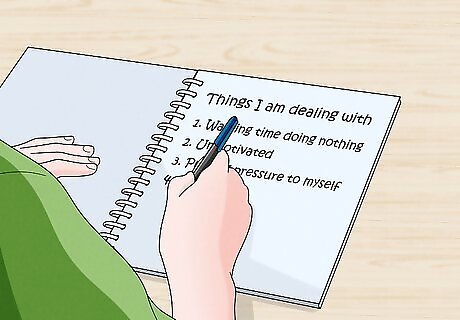
What are the issues that make you feel stuck, lost, or unfulfilled? Take some time to really think about—and even write down—what you’re dealing with. Is it your job? Friends? Relationship? Bad habits? Your general outlook? Something completely different? In any case, you have to figure out what's wrong before you can get to work fixing it. Your initial answer might be “everything,” and that’s okay, but see if you can dig down a little deeper. The closer you can get to identifying the true source or sources of your unhappiness, the better able you’ll be to address them. No matter how big your issues are, don’t lose hope. At the end of the day, you create your life. Whether one thing or lots of things need to be fixed, it's all doable.
Challenge negative thoughts that block your path.

What are the “mental roadblocks” that keep getting in your way? The old phrase “you are your own worst enemy” definitely applies here. While you can’t control the hand you’ve been dealt in life, you do get to choose how to play that hand. So ask yourself what patterns of negative thinking are keeping you from playing it better. You have to clear away these mental roadblocks before you can change your life for the better. Think of it this way: being stuck in a miserable job isn’t the problem—it’s a symptom of the problem, which might be your fear of taking a risk and trying something new. Being self-aware is the only way you can really change your thinking. Take the time to look inward so you can really turn things around.
Tell yourself that you will succeed.

Don’t just hope that you can change—know that you can! To achieve success, first put yourself in the mindset of expecting success. Practice reframing your thoughts from negative or neutral to positive. For instance, when you catch yourself thinking “My life is terrible,” repeat to yourself, "I'm not satisfied with my life right now, but I’m doing something about that." Try intentionally practicing positive thinking for 15 minutes a day, such as when you get up in the morning. While repeating confident statements in your head is great, consider also writing them down and reading them to yourself as needed throughout the day.
Set clear goals you can achieve.

Define measurable achievements that you can reach in set time frames. This is another instance when you need to take some time and look inward. Identify the passions, dreams, or goals that drive you to want to make changes in your life. Imagine yourself in six months, or a year, or 10 years, or whatever it will take to achieve your ultimate goal. Then start thinking about how you’ll get there! Do you see yourself living in a new place? Maybe taking a different job? Or working on a new project or business? Or going back to school? There's no wrong answer here, so long as it’s your answer. The clearer you make your goals, the more realistic it will be for you to achieve them. Write down what you want to achieve, and don’t be afraid to aim high! For example, say that your primary goal is to reestablish relationships with your estranged family members within the next year. You might start by planning to connect with your sibling, with whom you used to be very close, within the next month.
Devise a plan of action.
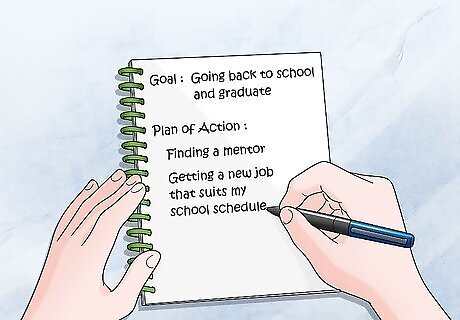
What specific steps will you take to move toward your goals? Once you’ve set your path for turning things around, it's time to form a plan of action. Break your ultimate goal down into smaller goals that you can work toward along the way. Write down what these goals are and how you will reach each one. For example, say your ultimate goal is to go back to school so you can complete the degree you didn’t finish. Your plan of action might include intermediary steps like figuring out your financial aid options, finding a mentor, and getting a new job that better suits your school schedule.
Move beyond what’s holding you back.

What in your life is blocking your path or weighing you down? You might, for example, be stuck in a bad relationship or caught in a dead-end job. Admit to yourself that these things are holding you back. And, as tough as it may be, you owe it to yourself to get free of them. Turning your life around means turning away from certain parts of your old life. Let’s be honest here: dumping your longtime (but toxic) best friend is no fun. It’s really hard to do. But if they’re a negative influence on you and an obstacle to your turnaround plan, then making this difficult change is necessary.
Seek guidance from reliable people.

Share with, and learn from, the trustworthy people in your life. Seek out one or more people in your circle—parents, siblings, family members, close friends, etc.—who understand where you’re coming from and are ready to offer a listening ear and helpful advice. Confide in them and listen to them—you’ll almost certainly find out that they’ve experienced their own life crises as well. When you’re experiencing tough times, it can feel like the people in your life already have it all figured out. But they’ve had rocky stretches too, and may still be having them now. Simply by sharing and listening to each other, you may end up helping them as much as they help you!
Add sources of motivation to your day.
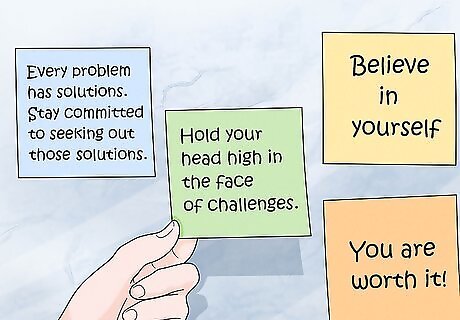
What are the little things in life that give you the boost you need? Maybe it’s taking a quick look at your favorite motivational poster or meme. Or maybe it’s watching an uplifting movie, taking a nature walk, leaving yourself positive notes, or rewarding yourself for your positive strides each day. In any case, these little sources of motivation build upon each other and help keep you on track. For example, get your day off to a positive start by changing your alarm to something that invigorates you (whether it's The Circle of Life or The Ride of the Valkyries is up to you). "Oh no" can turn into "Let’s go" easier than you think!
Develop a daily routine.

Put small decisions on autopilot so you can focus on the important stuff. Having consistent routines allows you to conserve mental energy by cutting back on the number of decisions you have to make. Sure, starting out each day without worrying about which shirt you're going to wear or what you’re going to have for breakfast may not seem like much. But you can only make so many decisions in a day, so having routines allows you to save energy for the important stuff! Try little things like planning out your wardrobe and your menu for the week ahead and scheduling times for exercise and relaxation in your calendar.
Hold yourself accountable.

Challenge yourself to keep moving ahead in spite of any obstacles. You’ve made big plans for your turnaround, but can you follow through? The short answer: yes! Keep your eyes on your path, get your mind and body in a good place, and go one step at a time, regardless of how long your journey takes. That class you've signed up for? Go. Your therapist? Make an appointment. Submit job resumes. Go on dates. Attend meetings. Initiate a family lunch. Get on that treadmill. Getting started is often the hardest part—but you can do it! Keep in mind that holding yourself accountable doesn’t mean beating yourself up whenever you fall short—which you’ll surely do from time to time. Instead, it means picking yourself up, dusting yourself off, and recommitting yourself to getting back on the path you’ve set for yourself.
Periodically reevaluate your path.

Is your original turnaround plan still the best plan going forward? Once your life turnaround begins, you may find that some of your intermediate and long-term goals just don’t quite fit anymore. And that’s perfectly okay. Find a schedule that works for you—for example, once a month—to sit down and reevaluate your plan of action and goals for turning your life around. Make whatever adjustments are necessary to suit your current situation. For example, if you’re trying to break a cycle of drug abuse in your life, you may have originally believed that your goal was to get as far away from that world as possible. However, you might find that your real calling is to help others who are struggling with addiction.
Exercise, sleep well, and eat right.
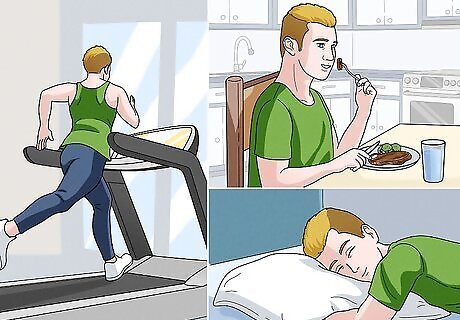
Make sure your turnaround plan also includes your physical health. After all, your mind and body are interconnected—if your body feels good, it's a lot easier for your mind to feel good. The three basic keys to physical health are regular exercise, a healthy diet, and adequate sleep. If you don't have time for these, make time. You owe it to yourself! Aim for 150 minutes of moderate intensity aerobic exercise per week, along with 2-3 strength training sessions. Try to get 7-9 hours of uninterrupted, high-quality sleep per night. Choose more fruits and vegetables, whole grains, lean proteins, and healthy fats, and fewer processed foods, added sugars, and unhealthy fats.
Work on your financial security.
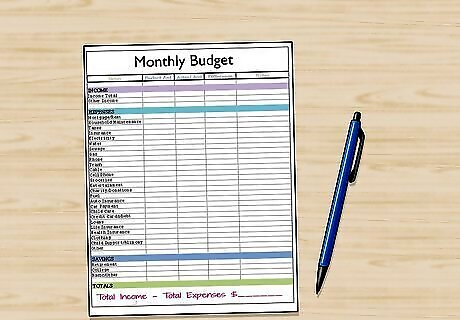
Earning, saving, and spending wisely can help you achieve your goals. No, a financial turnaround won’t automatically turn your life around—there are plenty of unhappy lottery winners out there. But being on firmer financial ground can help reduce your stress in the present and make it easier for you to envision a positive future. Depending on your current financial situation, one or more of the following steps may benefit you: Analyzing your spending and cutting back on unnecessary expenditures. Creating a monthly budget—and sticking to it. Starting a savings account, or increasing what you put into your savings. Asking for a raise, changing jobs, or taking on a manageable “side hustle.” Furthering your education to improve your earning potential. Working with a professional financial advisor, or a “financial therapist” who combines financial and mental health counseling.
Try mental health therapy.

Working with a mental health professional is a sign of strength, not weakness. Not everyone needs professional help in order to turn their life around, but there’s a very good chance that it can benefit you in your turnaround. A trained and experienced therapist can help you develop strategies for overcoming the barriers in your life, setting achievable goals, marking your progress, managing your missteps, and celebrating your successes. Mental health therapists use a range of strategies based on your particular circumstances and needs. You might, for instance, use cognitive behavioral therapy (CBT), which helps you to identify, challenge, and change thoughts and behaviors that act as barriers in your life. It’s important to find a therapist who you are comfortable sharing with openly and honestly. If you have a primary care physician, it may be a good idea to seek referrals for experienced therapists in your area.
Be patient with yourself.

Turning things around isn’t easy, and it’s okay that you’ll slip up here and there. The fact that you’ve decided to turn your life around is a great achievement in itself. Each time you reach one of the goals along your new path, you have another reason to celebrate. Each time you come up short, however, briefly reflect on what you can learn from the experience, forgive yourself, and get right back to work!




















Comments
0 comment